On a Bicentennial Threshold:
"The President's Own"
It was a special changing of the guard. The symbol of leadership that passed hands in a memorable ceremony that took place in Washington on July 11, 1996 was not a sword or saber but a baton. The United States Marine Band, "The President's Own," had a new director as Colonel John R. Bourgeois, who had been with the Marine Band since 1958 and had served as its Director since 1979, passed the Sousa Baton — the very baton used by John Philip Sousa — to LtCol Timothy W. Foley, making him the 26th Director of the 199-year-old ensemble.
If ever there was an unmistakable and poignant sense of history surrounding an American organization, the Marine Band was imbued with it and exuded it in every possible way, recalling as it did the events at which the ensemble participated, the personalities it entertained and enlightened, the colorful uniforms it sported, the heraldic military bearing it displayed, the worldwide esteem in which it has been held, and, of course, the breadth of its musical scope and brilliance of its virtuosity from the earliest times on to the present.
Earliest times, in the case of the United States Marine Band, is no hyperbole. At the bottom of the Band's stationery and informational material is the prominent reminder that it has been "playing America's music since 1798," the year it was established by an Act of Congress, making it the country's oldest professional musical organization. Its primary mission is to provide music for the President of the United States and the Commandant of the Marine Corps, but its calling has exceeded many times over the idea behind the assemblage, authorized by President John Adams, of a drum major, fife major, and 32 drums and fifes. From 1798 to 1800, the Marine Band was stationed in Philadelphia until the nation's capital was moved to Washington where it made its White House debut on New Year's Day, 1801.
Thomas Jefferson, an avid music lover and amateur violinist, took great interest in the Marine Band and is credited with giving it the title "The President's Own." In 1801, the band moved to its present home at Marine Barracks, 8th and I Streets, S.E., thus making it the longest
tenant of the Barracks and also the oldest continuously active unit in the Marine Corps. On March 4, 1801, the Marine Band performed for Thomas Jefferson's inauguration and has played at every Presidential inauguration since.
A handsome descriptive booklet contains, in words and pictures, a chronological sequence of vignettes from which some aspect of the Marine Band's presence may be gleaned:
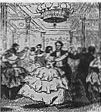
March 4, 1809: The Marine Band performed for James Madison's Presidential inaugural ball, the first ever held. The President, First Lady Dolley Madison, and their guests were serenaded with popular songs and dances of the period.
July 4, 1828: The Marine Band first performed "Hail to the Chief" for a President when John Quincy Adams attended the groundbreaking of the C&O Canal. Newspapers reported "airs from the Marine Band lightened the toil..."
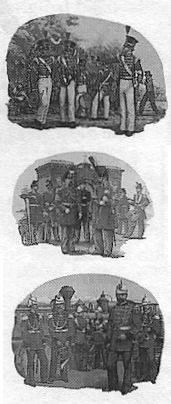
November 19, 1863: The band accompanied President Lincoln to Gettysburg for the dedication of the National Cemetery and his immortal Gettysburg Address. During the Civil War, the Marine Band lifted spirits with concerts in Lafayette Park across from the White House.
October 1, 1892: 26-year-old John Philip Sousa was appointed 17th Leader, a post he held for 12 years. During this time, the band made its first concert tour, premiered many of Sousa's most famous marches, and produced some of the first phonograph recordings ever made.
May 17, 1922: Music of "The President's Own" reached homes across the nation when the first Marine Band radio program was broadcast. Other broadcasts ensued, including "The Dream Hour," which became the longest sustaining program on network radio.
May 20, 1943: The band performed a special wartime concert on the White House South Lawn for President Roosevelt and Winston Churchill. Despite a steady rain, Roosevelt and Churchill stayed throughout and sang "The Battle Hymn of the Republic" with the band at the conclusion.
November 25, 1963: As the nation mourned and the world watched, the Marine Band, at the request of Mrs. Kennedy, led the funeral procession of President John F. Kennedy.
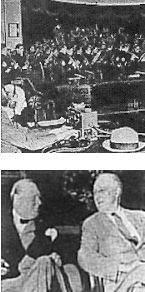
July 4, 1986: Amid fireworks and festivities, the Marine Band performed in New York City for the centennial celebration of the Statue of Liberty, recreating the band's performance under John Philip Sousa 100 years earlier.
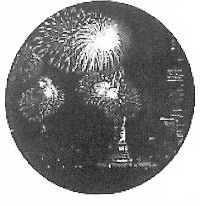
February 6-23, 1990: Combining music of Sousa with images of Lenin, the Marine Band toured five cities in the former Soviet Union, becoming the only American military band to tour the USSR before its transformation into independent states.
So successful has the marching and patriotic aspect of the Marine Band been, especially since the tutelage of the March King, that its other dimensions tend to be dwarfed. It may come as a surprise to many, for example, that the ensemble includes a complete string orchestra which provides ceremonial and background music (both classical and popular) at the White House. Whether performing for South Lawn arrival ceremonies, State dinners, receptions, or accompanying famous entertainers, Marine Band musicians appear at the White House more than 200 times annually. The 143 musicians — 38 of them are women — that strike up this band include a support staff of 20 and a complement of 22 string players, giving it the resources to perform in virtually any musical medium.
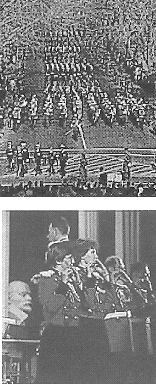
And mix it up they do. No ensemble in the world boasts a more varied musical diet. In addition to the serenades for visiting dignitaries at the White House and the musical pageantry and stirring marches for which it is famous, the Band presents each year a whole series of chamber music and chamber orchestra concerts. A dance band is drawn from its membership to supply music at diplomatic social functions. It was among the first musical organizations to try its hand at recording, back in the days of phonograph cylinders, and it uses today the most modern techniques to preserve its stunning performances. And nations far and wide, including England, Norway, Ireland, The Netherlands, and the former Soviet Union, have been treated to musical good-will missions by way of the Band's periodic international tours.
While the other service organizations also operate fine bands, it is the Marine Band that has traditionally qualified as "the President's Own" and that is called upon as the official provider of music, from performing "Hail to the Chief" prior to a Presidential appearance to funerals at Arlington National Cemetery to its innumerable concert appearances,
both indoors and outdoors. Its musicians are selected by the same type of auditioning process as are players in the major civilian orchestras. Having passed rigorous auditions, they report to a Marine recruiter and undergo the enlistment process to become assigned to the sole duty — it is considered "military" but not "tactical" — of performing with the
United States Marine Band.
It is the wide range of their musical offerings that distinguishes these players from average symphony musicians. Col. Foley points out that bands throughout the ages have served a great variety of functions in bringing music to people. "They play concert and art music, they play marching music for soldiers going off to war, they play circus music and music at ball games — as opposed to a symphonic concert, where people have to come to the orchestra. The band is a more mobile group and that makes band musicians a little different. They tend to be more resilient."
A casual look at the Band's repertory reveals certain philosophical or attitudinal differences between it and its symphonic counterparts. Being the oldest ongoing provider of music in America and not beleaguered by some of the problems, economic and otherwise, facing civilian orchestras, the Band recognizes the multiplicity of musical tastes and regards as its mission the opportunity of performing to all types of audiences, from the most populist to the most rarified. Moreover, under this and previous directorships, the Band has recognized its obligation and commitment to contemporary composers. Both John Harbison and Karel Husa have enjoyed many performances of their
works, as have most composers who have written important works in the wind ensemble medium. During 1996 alone, the Band has programmed over 100 pieces by 20thcentury composers such as Barber, Bartok, Bernstein, Britten, Hindemith, Ligeti, Martinu, Schuller, and Shostakovich. It also has to its credit an imposing list of works especially commissioned to mark a variety of events or meetings of such organizations as the National Band Association, Midwest International Band and Orchestra Clinic, and Music Educators National Conference. Col. Foley recalls composer Warren Benson's remark that bands are very user-friendly, adding that he wished more composers knew that and felt that way. "We can play the music of Colgrass and Maw and Husa for our audiences and not have to worry so much about the sale of tickets."
The audiences flocking to hear the Band (or various components of it) seem to be as loyal and enthusiastic as are the fans of a major league football or baseball team. To keep them networked and tuned in to the Band's comings and goings, there's Notes. Mention a periodical
called Notes to just about anyone in or around music and they will immediately associate
it with the quarterly journal of the Music Library Association. Not so for "The President's Own" family, to whom Notes happens to be the newsletter of the U.S. Marine Band, published bimonthly, according to its mast, for that organization's friends, some 23,000 of them.
As the United States Marine Band approaches its bicentennial anniversary, what is the outlook for the upcoming era? "Well," says Col. Foley, "I have a dual responsibility. One is to be the keeper of the flame. We do not let our great traditions pass away; that means the heritage of John Philip Sousa and the wonderful music he wrote. It is important that people are Portico of the White House aware of them and that they do not forget them. I have the feeling that some of our great American traditions and our appreciation of history — historical institutions, whatever they might be — have been a little bit 'dumbed down,' and it's very important to me that this not happen to this organization. But moving into the 21st century, I believe that we have a very high artistic responsibility to living musicians. We are, after all, a musical performing group and as such, we have an obligation to living composers. We must encourage the composition and furthering of music for winds. After all, we serve something that is a living thing as well as a past history. It's important that we keep our sights set in both directions."
|